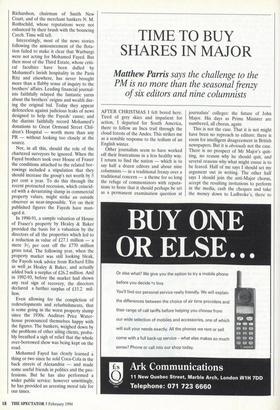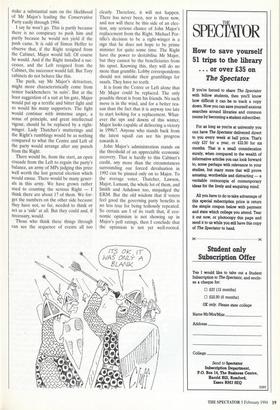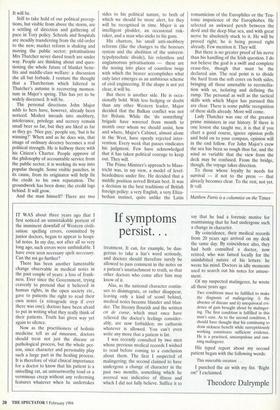TIME TO BUY SHARES IN MAJOR
Matthew Parris says the challenge to the PM is no more than the seasonal frenzy
of six editors and nine columnists
AFTER CHRISTMAS I felt bored here. Tired of grey skies and impatient for action, I departed for South America, there to follow an Inca trail through the cloud forests of the Andes. This strikes me as a sensible response to the tedium of an English winter.
Other journalists seem to have worked off their frustrations in a less healthy way. I return to find the nation — which is to say half a dozen editors and about nine columnists — in a traditional frenzy over a traditional concern — a theme for so long the refuge of commentators with reputa- tions to hone that it should perhaps be set as a permanent examination question at
journalists' colleges: the future of John Major. His days as Prime Minister are numbered, all chorus, again.
This is not the case. That it is not might have been no reproach to editors: there is room for intelligent disagreement in British newspapers. But it is obviously not the case. There is no prospect of Mr Major's quit- ting, no reason why he should quit, and several reasons why what might ensue is to be feared. Half of me says I should set my argument out in writing. The other half says I should join the anti-Major chorus, accept the resulting invitations to perform in the media, cash the cheques and take the money down to Ladbroke's, there to
stake a substantial sum on the likelihood of Mr Major's leading the Conservative Party easily through 1994.
I say he won't go. This is partly because there is no conspiracy to push him and partly because he would not yield if the push came. It is odd of Simon Heffer to observe that, if the Right resigned from the Cabinet, Major would fall. Of course he would. And if the Right installed a suc- cessor, and the Left resigned from the Cabinet, the successor would fall. But Tory cabinets do not behave like this.
The push, say Mr Major's detractors, might more characteristically come from senior backbenchers 'in suits'. But at the least suggestion of a suit at his gate, Major would put up a terrific and bitter fight and so would his many supporters. The fight would continue with immense anger, a sense of principle, and great intellectual vigour, should he be replaced by a right- winger. Lady Thatcher's mutterings and the Right's rumblings would be as nothing compared to what the Centre and Left of the party would arrange after any putsch from the Right.
There would be, from the start, an open crusade from the Left to regain the party's balance, an army of MPs judging this prize well worth the lost general election which would ensue. There would be many gener- als in this army. We have grown rather used to counting the serious Right — I think there are about 17 of them. We for- get the numbers on the other side because they have not, so far, needed to think or act as a 'side' at all. But they could and, if necessary, would.
Those who think these things through can see the sequence of events all too clearly. Therefore, it will not happen. There has never been, nor is there now, and nor will there be this side of an elec- tion, any serious chance of John Major's replacement from the Right. Michael Por- tillo's decision to be a right-winger is a sign that he does not hope to be prime minister for quite some time. The Right have the power to destabilise Mr Major, but they cannot be the beneficiaries from his upset. Knowing this, they will do no more than grumble. Lobby correspondents should not mistake their grumblings for snarls. They have no teeth.
It is from the Centre or Left alone that Mr Major could be replaced. The only possible threat is from his friends. No such move is in the wind, and for a better rea- son than the fact that it is anyway too late to start looking for a replacement. What- ever the ups and downs of this winter, Major looks capable of delivering a victory in 1996/7. Anyone who stands back from the latest squall can see his progress towards it.
John Major's administration stands on the threshold of an appreciable economic recovery. That is hardly to this Cabinet's credit, any more than the circumstances surrounding our forced devaluation in 1992 can be pinned only on to Major. To the average voter, Thatcher, Lawson, Major, Lamont, the whole lot of them, and Smith and Ashdown too, misjudged the ERM. But the old wisdom that if voters feel good the governing party benefits is no less true for being tediously repeated. So certain am I of its truth that, if eco- nomic optimism is not showing up in Major's poll ratings, then I conclude that the optimism is not yet well-rooted. It will be.
Still to take hold of our political percep- tions, but visible from above the storm, are a settling of direction and gathering of pace in Tory policy. Schools and hospitals are steadily transferring from the old order to the new; market reform is shaking and moving the public sector; privatisations Mrs Thatcher never dared touch are under way. People are thinking about and ques- tioning the whole future of blanket bene- fits and middle-class welfare: a discussion she all but forbade. I venture the thought that a Thatcherism which faltered in Thatcher's autumn is recovering momen- tum in Major's spring. This has yet to be widely discerned. It will be.
The personal directions John Major adds to hers have, however, already been noticed. Modest inroads into snobbery, intolerance, privilege and secrecy remain small beer so far, but they are liked as far as they go. 'Nice guy,' people say, tut is he winning?' When and as he does win, that image of ordinary decency becomes a real political strength. He is halfway there with his Citizen's Charter. People approve of the philosophy of accountable service from the public sector; it is working its way into popular thought. Some visible punches, in its cause, from its originator will help fix the credit to his own reputation. The groundwork has been done; the credit lags behind. It will grow.
And the man himself? There are two sides to his political nature, to both of which we should be more alert, for they will be recognised in time. Major is an intelligent plodder, an occasional risk- taker, and a man who sticks to his guns.
His charters, his small anti-snobbery reforms (like the changes to the honours system and the abolition of the universi- ty/polytechnic divide), his relentless and unglamorous privatisations — these are the nosing into place of countless twigs with which the beaver accomplishes what only later emerges as an ambitious scheme of civil engineering. If the shape is not yet clear, it will be.
But there is another side. He is occa- sionally bold. With less hedging or doubt than any other Western leader, Major decided that the Balkan conflict was not for Britain. While the 'do something' brigade have wavered from month to month over whom we should assist, how and where, Major's Cabinet, almost alone in the West, have openly rejected inter- vention. Every week that passes vindicates his judgment. Few have acknowledged that it has taken political courage to keep out. They will.
The Prime Minister's approach to Maas- tricht was, in my view, a model of level- headedness under fire. He decided that a middle position served Britain best. It was a decision in the best traditions of British foreign policy: a very English, a very Eliza- bethan instinct, quite unlike the Latin romanticism of the Europhiles or the Teu- tonic impatience of the Europhobes. He selected an awkward perch between the devil and the deep blue sea, and with great nerve he absolutely stuck to it. He will be proved right; he is being proved right already. Few mention it. They will.
But there is no greater proof of his nerve than his handling of the Irish question. I do not believe the goal is a swift and complete cease-fire, though that must be the declared aim. The real point is to divide the hard from the soft cores on both sides, bringing all those amenable to reconcilia- tion with us, isolating and defining the rump. The personal as well as the tactical skills with which Major has pursued this are clear. There is some public recognition of these skills already. More will come.
Lady Thatcher was one of the greatest prime ministers in our history. If there is one lesson she taught me, it is that if you chart a good course, ignore opinion polls and hold on to your compass, opinion will in the end follow. For John Major's crew the sea has been so rough thus far, and the wind so variable that the view from the deck may be confused. From the bridge, though, the voyage takes direction.
To those whose loyalty he needs for survival — if not to the press — that already becomes clear. To the rest, not yet. It will.
Matthew Parris is a columnist on the Times




















































 Previous page
Previous page